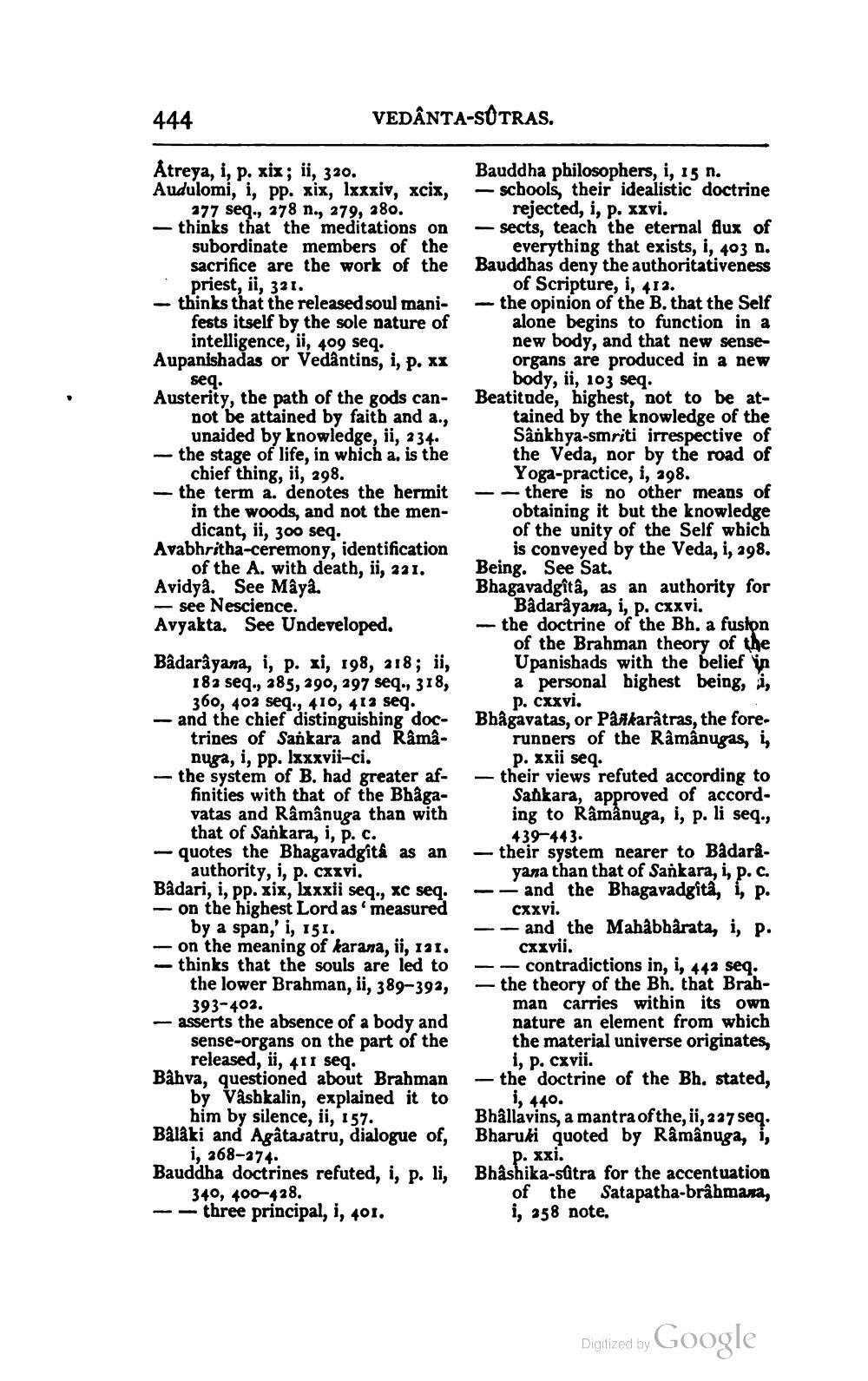________________
444
VEDÂNTA-SOTRAS.
Åtreya, i, p. xix; ii, 320. Audulomi, i, pp. xix, lxxxiv, xcix,
777 seq., 278 n., 279, 280. - thinks that the meditations on
subordinate members of the sacrifice are the work of the
priest, ii, 321. thinks that the released soul mani
fests itself by the sole nature of
intelligence, ii, 409 seq. Aupanishadas or Vedântins, i, p. XX
seq.
Austerity, the path of the gods can-
not be attained by faith and a.,
unaided by knowledge, ii, 234. - the stage of life, in which a. is the
chief thing, ii, 298. -- the term a. denotes the hermit
in the woods, and not the men
dicant, ii, 300 seq. Avabhritha-ceremony, identification
of the A. with death, ii, 231, Avidya. See Mâya. - see Nescience. Avyakta. See Undeveloped.
Bâdarayana, i, p. xi, 198, 218; ii,
182 seq., 285, 290, 297 seq., 318,
360, 402 seg., 410, 413 seg. - and the chief distinguishing doc-
trines of Sankara and Ramanuga, i, pp. Ixxxvii-ci. the system of B. had greater af
finities with that of the Bhagavatas and Râmânuga than with
that of Sankara, i, P. c. - quotes the Bhagavadgitá as an
authority, i, p. cxxvi. Badari, i, pp. xix, lxxxii seq., xc seq. - on the highest Lord as 'measured
by a span,'i, 151. - on the meaning of karana, ii, 121. - thinks that the souls are led to
the lower Brahman, ii, 389-392,
393-402. - asserts the absence of a body and
sense-organs on the part of the
released, ii, 411 seq. Bahva, questioned about Brahman
by Vashkalin, explained it to
him by silence, ii, 157. Balaki and Agâtasatru, dialogue of,
i, 368-374. Bauddha doctrines refuted, i, p. li,
340, 400-428. - three principal, i, 401.
Bauddha philosophers, i, 15 n. - schools, their idealistic doctrine
rejected, i, p. xxvi. - sects, teach the eternal flux of
everything that exists, i, 403 n. Bauddhas deny the authoritativeness
of Scripture, i, 412. - the opinion of the B. that the Self
alone begins to function in a new body, and that new senseorgans are produced in a new
body, ii, 103 seq. Beatitude, highest, not to be at
tained by the knowledge of the Sankhya-smriti irrespective of the Veda, nor by the road of
Yoga-practice, i, 298. -- there is no other means of
obtaining it but the knowledge of the unity of the Self which
is conveyed by the Veda, i, 298. Being. See Sat. Bhagavadgîtâ, as an authority for
Badarayana, i, p. cxxvi. - the doctrine of the Bh. a fusion
of the Brahman theory of the Upanishads with the belief in a personal highest being, i,
p. cxxvi. Bhagavatas, or Pankarâtras, the fore
runners of the Râmânugas, i,
p. xxii seq. - their views refuted according to
Sankara, approved of according to Ramảnuga, i, p. li seq.,
439-443. - their system nearer to Badari.
yana than that of Sankara, i, P. C. - and the Bhagavadgitâ, i, p.
cxxvi. -- and the Mahabharata, i, p.
cxxvii. - - contradictions in, i, 443 seq. — the theory of the Bh. that Brah
man carries within its own nature an element from which the material universe originates,
i, p. cxvii. - the doctrine of the Bh. stated,
i, 440. Bhållavins, a mantra of the, ii, 227 seq. Bharuki quoted by Râmânuga, i,
p. xxi. Bhashika-sútra for the accentuation
of the Satapatha-brahmana, i, 258 note.
Digitized by
Digized by Google




